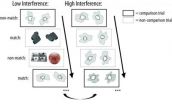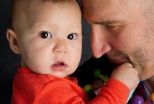(Press-News.org) The relatively new field in microbiology that focuses on quorum sensing has been making strides in understanding how bacteria communicate and cooperate. Quorum sensing describes the bacterial communication between cells that allows them to recognize and react to the size of their surrounding cell population. While a cell's output of extracellular products, or "public goods," is dependent on the size of its surrounding population, scientists have discovered that quorum sensing, a type of bacterial communication, controls when cells release these public goods into their environments.
In a study appearing in the Oct. 12 issue of the journal Science, University of Washington researchers examine the pathogen Pseudomonas aeruginosa, which colonizes in the lungs of cystic fibrosis patients. While most cells "cooperate" with each other by producing and sharing public goods when there are enough of their "friends" around, researchers have found that certain individual cells, known as "cheater cells," share in the use of these extracellular products without releasing any of these products themselves.
In Pseudomonas aeruginosa these cheaters are quorum sensing mutants that don't make public goods in response to increasing population density. When the researchers manipulated the environment so that the cost of cell cooperation was high (so that the bacterial group had to produce a lot of public goods to survive), the cheater cells overtook the cooperating producer cells, the cooperators then became too rare, and the population collapsed. From this sequence of events, the researchers induced destabilization of cooperation. They also manipulated environmental conditions to restrict cheaters and stabilize cooperation.
Scientists recognize this fundamental research as taking them steps closer to a different antibiotic-independent way to manage infections.
"Perhaps, one day, we'll be able to manipulate infections so that bacterial cooperation is destabilized and infections are resolved, "said Dr. Peter Greenberg, UW professor of microbiology and one of the three authors of the study.
"Biologists think of social interactions as being the push and pull between cooperation and conflict," he explained. "This is true of man and bacteria. Not so many years ago, people didn't think bacteria socialized at all. Now we are beginning to think we might manipulate bacterial social activity for the benefit of human health."
In the future, Greenberg said, this research may enable scientists to manipulate bacterial conditions in order to cause cell populations of dangerous pathogens to collapse.
"By learning about the fundamentals of quorum sensing control of cell cooperation, we are beginning to have a glimmer of insight into how to control and manipulate infecting populations of P. aeruginosa and other dangerous pathogens with similar systems," Greenberg said. "We've also gained new insights into how cell cooperation can be stably maintained in biology. It is much more straightforward to study sociality in bacteria than in animals. The payoffs may be in understanding what drives cooperation and conflict in general, and in developing strategies for infection control. "
###
About UW Medicine
UW Medicine trains health professionals and medical scientists, conducts research to improve health and prevent disease worldwide, and provides primary and specialty care to patients throughout Seattle/King County and the WWAMI (Washington, Wyoming, Alaska, Montana and Idaho) region. UW Medicine includes: Harborview Medical Center, Northwest Hospital & Medical Center, Valley Medical Center, UW Medical Center, UW Neighborhood Clinics, UW Physicians, UW School of Medicine and Airlift Northwest. UW Medicine also shares in the ownership and governance of the Seattle Cancer Care Alliance with Seattle Children's Hospital and Fred Hutchinson Cancer Research Center and shares in ownership of Children's University Medical Group with Seattle Children's Hospital.
UW Medicine has major academic and service affiliations with Seattle Children's Hospital, Fred Hutchinson Cancer Research Center, the Veteran's Affairs Puget Sound Health Care System in Seattle, and the VA Hospital in Boise, Idaho. The UW School of Medicine has been ranked No. 1 in the nation in primary-care training for the past 18 years by US News & World Report. It is the top public institution for receipt of biomedical research funding from the National Institutes of Health (NIH) and second among all institutions for NIH funding, public and private. UW Medicine's 2,000 full-time faculty and nearly 5,000 volunteer and part-time faculty include four Nobel Laureates, 32 members of the National Academy of Sciences, and 33 members of the Institute of Medicine. For more information, visit UW Medicine. Follow us on Twitter - @UWMedicineNews END
University of Washington researchers focus on quorum sensing to better understand bacteria
2012-10-12
ELSE PRESS RELEASES FROM THIS DATE:
Researchers ID unique geological 'sombrero' uplift in South America
2012-10-12
Scientists at Scripps Institution of Oceanography at UC San Diego have used 20 years of satellite data to reveal a geological oddity unlike any seen on Earth.
At the border of Argentina, Bolivia and Chile sits the Altiplano-Puna plateau in the central Andes region, home to the largest active magma body in Earth's continental crust and known for a long history of massive volcanic eruptions. A study led by Yuri Fialko of Scripps and Jill Pearse of the Alberta Geological Survey has revealed that magma is forming a big blob in the middle of the crust, pushing up the earth's ...
In the bacterial world of your mouth, nurture wins out over nature
2012-10-12
October 12, 2012 – The human mouth is home to a teeming community of microbes, yet still relatively little is known about what determines the specific types of microorganisms that live there. Is it your genes that decide who lives in the microbial village, or is it your environment? In a study published online in Genome Research (www.genome.org), researchers have shown that environment plays a much larger role in determining oral microbiota than expected, a finding that sheds new light on a major factor in oral health.
Our oral microbiome begins to take shape as soon ...
Meteorite delivers Martian secrets to University of Alberta researcher
2012-10-12
(Edmonton) A meteorite that landed in the Moroccan desert 14 months ago is providing more information about Mars, the planet where it originated.
University of Alberta researcher Chris Herd helped in the study of the Tissint meteorite, in which traces of Mars' unique atmosphere are trapped.
"Our team matched traces of gases found inside the Tissint meteorite with samples of Mars' atmosphere collected in 1976 by Viking, NASA's Mars lander mission," said Herd.
Herd explained that 600 million years ago the meteorite started out as a fairly typical volcanic rock on the surface ...
Surprising solution to fly eye mystery
2012-10-12
Fly eyes have the fastest visual responses in the animal kingdom, but how they achieve this has long been an enigma. A new study shows that their rapid vision may be a result of their photoreceptors - specialised cells found in the retina - physically contracting in response to light. The mechanical force then generates electrical responses that are sent to the brain much faster than, for example, in our own eyes, where responses are generated using traditional chemical messengers. The study was published today, 12 October, in the journal Science.
It had been thought ...
Weizmann Institute Scientists observe quantum effects in cold chemistry
2012-10-12
At very low temperatures, close to absolute zero, chemical reactions may proceed at a much higher rate than classical chemistry says they should – because in this extreme chill, quantum effects enter the picture. A Weizmann Institute team has now confirmed this experimentally; their results would not only provide insight into processes in the intriguing quantum world in which particles act as waves, it might explain how chemical reactions occur in the vast frigid regions of interstellar space.
Long-standing predictions are that quantum effects should allow the formation ...
Developmental biologist proposes new theory of early animal evolution
2012-10-12
VALHALLA, October 11, 2012—A New York Medical College developmental biologist whose life's work has supported the theory of evolution has developed a concept that dramatically alters one of its basic assumptions—that survival is based on a change's functional advantage if it is to persist. Stuart A. Newman, Ph.D., professor of cell biology and anatomy, offers an alternative model in proposing that the origination of the structural motifs of animal form were actually predictable and relatively sudden, with abrupt morphological transformations favored during the early period ...
Alzheimer's sufferers may function better with less visual clutter
2012-10-12
TORONTO, ON – Psychologists at the University of Toronto and the Georgia Institute of Technology – commonly known as Georgia Tech – have shown that an individual's inability to recognize once-familiar faces and objects may have as much to do with difficulty perceiving their distinct features as it does with the capacity to recall from memory.
A study published in the October issue of Hippocampus suggests that memory impairments for people diagnosed with early stage Alzheimer's disease may in part be due to problems with determining the differences between similar objects. ...
Exercise helps ease premature cardiovascular aging caused by type 2 diabetes
2012-10-12
WESTMINSTER, CO (October 10, 2012)—One of life's certainties is that everyone ages. However, it's also certain that not everyone ages at the same rate. According to recent research being presented this week, the cardiovascular system of people with type 2 diabetes shows signs of aging significantly earlier than those without the disease. However, exercise can help to slow down this premature aging, bringing the aging of type 2 diabetes patients' cardiovascular systems closer to that of people without the disease, says researcher Amy Huebschmann of the University of Colorado ...
Exercise could fortify immune system against future cancers
2012-10-12
WESTMINSTER, CO (October 10, 2012)—Researchers may soon be able to add yet another item to the list of exercise's well-documented health benefits: A preliminary study suggests that when cancer survivors exercise for several weeks after they finish chemotherapy, their immune systems remodel themselves to become more effective, potentially fending off future incidences of cancer. The finding may help explain why exercise can significantly reduce the chances of secondary cancers in survivors or reduce the chances of cancer altogether in people who have never had the disease.
Laura ...
Parental bonding makes for happy, stable child
2012-10-12
Parents: Want to help ensure your children turn out to be happy and socially well adjusted? Bond with them when they are infants.
That's the message from a study by the University of Iowa, which found that infants who have a close, intimate relationship with a parent are less likely to be troubled, aggressive or experience other emotional and behavioral problems when they reach school age. Surprisingly, the researchers found that a young child needs to feel particularly secure with only one parent to reap the benefits of stable emotions and behavior, and that being attached ...


